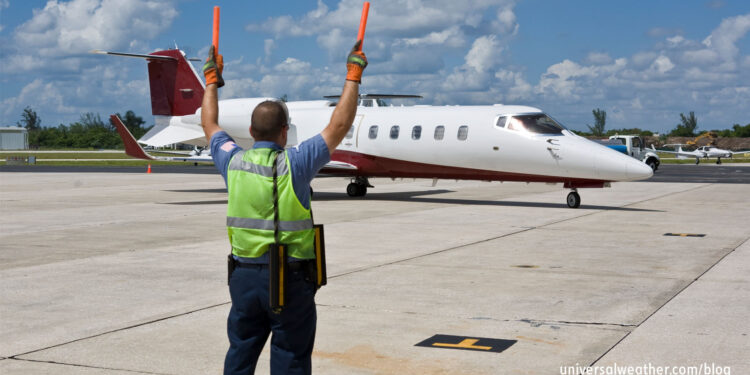Business Aircraft Operations to Aruba: Ground Handling and Security

This is a post by author Jean Pierre Krozendijk. At the time of writing, Jean Pierre was based at Universal Aviation Aruba – Oranjestad, which discontinued operation of the GAT in January 2018.
This business aviation blog post is part of a series on operating in Aruba and continues from our last article: “Business Aircraft Operations to Aruba: Airport Ops.”
Aruba (TNCA) is an excellent tech stop for business aircraft operations and offers a high standard of service for destination stops. Aircraft parking can fill up during busy periods, so at times you may need to drop and go. For best results, it’s always best to pre-notify your ground handler as to any needed service requirements.
The following are some tips when arranging ground handling in Aruba:
1. Know the ground handling process at TNCA
Your ground handler needs to know your itinerary, tail number, aircraft type, operator, and crew/passenger information to set up ground handling. Your handler will also want to know what services are required on arrival. For Customs, Immigration, and Quarantine (CIQ) clearance, an EPIC form – similar to a general declaration – needs to be filled out with crew/passenger details as well as some aircraft information. The ground handler will complete the EPIC form on behalf of the operator. Once a ground handling request is received, all arrangements are coordinated. Particularly during high season – Easter, October, December, and January – your ground handler will notify airport authorities of aircraft parking needs as limited parking can be an issue.
2. TNCA is not a 24-hour airport
Airport operating and handling hours are currently 0700-2359 local. Overtime is available only for air ambulance flights with prior notice. Always try to provide your ground handler with at least two hours’ prior notice of the estimated time of arrival – along with crew/passenger details – so that CIQ and aircraft services can be coordinated. For short-notice handling requests, at least 60 minutes’ notice is recommended.
3. Be aware of parking considerations
General Aviation (GA) ramp at TNCA handles up to 45 aircraft depending on aircraft sizes. Additional aircraft parking may be available on the commercial apron, but prior arrangement must be made. Be aware that during high season the airport can run out of GA parking and operators may need to drop and go. If an aircraft needs to be relocated on the field, the crew will be notified. It’s preferred, but not necessary, that crew can be present when the aircraft is moved. The ground handler has common ground support equipment on-site and uses a Lektro cart to move aircraft – up to the size of a Gulfstream IV – without requirement for a tow bar.
4. CIQ is at the FBO
CIQ is located at the Fixed-Base Operator (FBO), and the clearance process usually takes one to two minutes per person. Clearance may be up to five minutes if a lot of luggage is involved. Arrival/departure cards are required for crew/passengers, and the ground handler will pre-fill out most of the required information prior to aircraft arrival. CIQ clearance, and presentation of arrival/departure cards, is needed even for tech stops at TNCA. For tech stops, only passengers need to clear CIQ. For overnight stays, the ground handler escorts passengers and at least one crew member to the FBO for CIQ clearance. This crew member will then return to the aircraft, and, after aircraft is shut down, crew members who haven’t cleared CIQ will then go through the process. For departure there’s a security screening procedure followed by CIQ outbound clearance.
5. Your ground handler can arrange credit for all services
With prior arrangement credit can be established for fuel, services, and airport charges. Aviation fuel cards are accepted as well as major credit cards and cash (USD and Florin). Also, with prior arrangements the ground handler can extend credit for fuel. Airport fees – including landing fee, airport tax, CIQ charges, security charges, and passenger taxes – can be paid by the handler on behalf of an operator, and these charges can be invoiced. Parking fees are based on maximum takeoff weight.
6. Consider aviation fuel arrangements
Aviation fuel uplifts may only take place during airport hours and should be requested in advance by your ground handler. Fuel delays are possible during 1200-1500 local peak hours. Turnaround time for tech stops is typically 30-60 minutes, depending on volume of fuel uplift. In all cases passengers must exit the aircraft, under escort of a crew member, and go through CIQ clearance at the FBO. Onboard pets may also need to exit the aircraft or, at discretion of customs/immigration, may be permitted to remain onboard.
7. Airport security is good at TNCA
Airport security controls the apron and security checkpoints with local police officers on standby in case they’re needed. At TNCA there’s adequate fencing and security camera coverage with 24/7 patrols. Private unarmed aircraft security guards can be coordinated via your ground handler and airport security if needed.
8. Airside access is well controlled
Ramp access at TNCA is restricted to those with valid airport or escort badges. An escort badge – for an aviation maintenance technician or vendor needing access to your aircraft – can be issued by your ground handler upon presentation of passport or appropriate ID. These personnel must clear security and will be escorted by the ground handler while airside. Crew members returning to the aircraft do not require escort badges but must be escorted by ground handler.
9. Know additional services considerations
Airside access by private transportation providers is not usually permitted at TNCA except in the case of air ambulance flights. If you require any specialized GSE – such as stairs or air con units – arrange this with your ground handler in advance.
10. Know other security considerations
In Aruba it’s recommended to use vetted and secure transportation. Your ground handler can arrange this for you. If you’re taking a local taxi, be sure it’s one recommended by your ground handler or hotel. As with any other international locations, it’s best to not walk around alone at night and to practice basic personal security awareness while off-airport.
11. Additional reading: Business Aircraft Ops to Aruba – Series Index
Note: Links will be updated as articles are published.
- Part 1 – Airport operations
- Part 2 – Ground handling and security
- Part 3 – Catering, Cars, Pets & Guns
- Part 4 – Permits, PPRs, flight planning and weather
- Part 5 – CIQ information
- Part 6 – Fuel and hotels
Conclusion
The ground handling process is pretty straightforward in Aruba, with some basic advance planning. Best practice is to coordinate services in advance with the ground handler or a third-party provider.
Later, we’ll discuss catering, cars, pets, and guns for Aruba and their impact on your trip.
Questions?
If you have any questions about this article or would like assistance planning your next trip to Aruba, contact us at operationalinsight@univ-wea.com.




